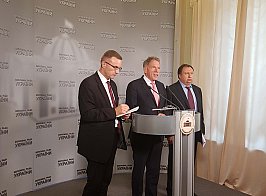International activity
The Committee on Ukraine’s integration into the EU ranks first in the openness rating

The CHESNO movement conducted monitoring of the openness of the Verkhovna
Rada’s committees’ work under martial law. According to the results, the
Committee on Ukraine’s integration into the EU shared first place with six
other committees: medical, anti-corruption, social policy, energy,
government organisation and human rights. The rating was compiled for the
second half of 2023. The transparency of the committees’ activities was
evaluated according to the following criteria: presence in the public
space, regular updates, including recordings of meetings and their timely
publication, informing about the decisions made etc.
The Chair of the Committee on Ukraine’s integration into the EU noted that
she appreciates the high evaluation of the openness of the Committee's
work. “We are very pleased that the Committee is among the leaders today,
but I will be very frank with you. I want to emphasise that we need to
join the efforts of public organisations that monitor the work of the
Verkhovna Rada of Ukraine and its committees to analyse if the criteria
proposed are purely formal or if they have the potential to advance the
work approach of the committees,” she said. According to Ivanna
Klympush-Tsintsadze, the focus should be made not only on the formal
criteria of openness of the committees but also on improving the approach
and organisation of their work. For example, the communication activities
of the Committee on Ukraine's EU Integration are supported by the EU
project Association4U but this does not change the situation
institutionally. The expert support of European donors to Ukrainian
authorities is limited in time. It is important to ensure the
institutional capacity of the Verkhovna Rada and its committees. According
to Ivanna Klympush-Tsintsadze, the Committee on Ukraine’s integration into
the EU, which now employs only nine specialists, has repeatedly requested
the leadership of the Verkhovna Rada to strengthen its institutional
capacity. Among all the committees, it bears the greatest administrative
burden of analysing and providing conclusions on the compliance of draft
laws with EU law. She thanked the representatives of the secretariat, who
helped to ensure the availability of the Committee’s YouTube channel, as
well as the posting of information and broadcasts of the Committee’s
meetings on YouTube and Facebook.
According to Ivanna Klympush-Tsintsadze, the CHESNO movement could work
with the leadership of the Verkhovna Rada of Ukraine to ensure
institutional changes. She also emphasised the need for transparency in
the work of the Parliament. “I think you missed online meetings of the
Conciliation Council of the Verkhovna Rada of Ukraine. They must be open
and broadcast. I believe that your voice would help to get back to
conducting Conciliation Councils in an open mode,” said Ivanny
Klympush-Tsintsadze. She also emphasised the need to restore journalists’
access to Parliament and committee meetings. The CHESNO Movement conducted
a survey regarding the resumption of live broadcasts of Verkhovna Rada
meetings. According to it, 65% of Ukrainians spoke in favour of resuming
these broadcasts. Now, according to Ivanna Klympush-Tsintsadze, the
Verkhovna Rada sessions are recorded between two and six in the morning.
“I don't think many people are willing to watch at this time what is
happening in the Verkhovna Rada of Ukraine. Even if we are talking about
recordings, we must ensure that they are broadcast at the time when people
can watch them,” the Chair of the Committee noted. She also emphasised
that it is necessary to restore the control function of the Parliament
during martial law, as well as the system of balances and counterbalances
so that Ukraine does not lose the gains of an open, democratic society,
which it has worked on for years.

